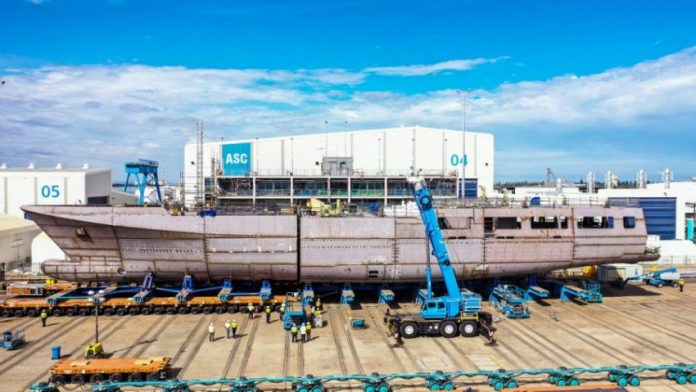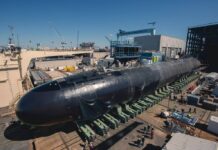
By David Uren*
Risks to the future of the Whyalla steel mill should be prompting the federal government to develop contingency plans to ensure Australia’s continued capacity to manufacture basic steel products. The Whyalla mill is Australia’s only producer of ‘long’ steel products, such as steel beams for construction and rails, and is an important supplier of reinforcing bars and steel plate. (The Australian Strategic Policy Institute. The Strategist.)
The Whyalla blast furnace is slowly coming back into commission after what was supposed to have been a 48 hour maintenance shutdown that turned into a three-month closure, during which customers have had to turn to imports.
However, concerns linger about the financial stability of the ultimate corporate owner, GFG Alliance, headed by entrepreneur Sanjeev Gupta, in the wake of the 2021 collapse of its chief financier, Greensill Capital.
Although the Australian operations report healthy profits, the overall group has faced challenges refinancing its debts while criminal authorities in both Britain and France investigate the group’s relationship with Greensill. GFG denies any wrongdoing and has managed to stave off direct threats to its solvency in the three years since Greensill collapsed.
However, the recent decision to delay for two years the purchase of a $500 million arc-furnace from Italy that was intended to speed Whyalla’s transition from coal has added to concerns of a cash squeeze. The Italian manufacturer suspended a contract to deliver a similar furnace to another GFG steel mill in the Czech Republic, after difficulties over payments.
The federal and South Australian governments have offered $110 million between them towards the arc furnace and an associated plant that would use hydrogen as a fuel to produce iron. Both tiers of government have justified their offers of support as advancing their climate change agendas, but the preservation of basic industrial capacity should be a priority.
Amid uncertainty about the security of supply of basic products from Whyalla, steel insiders say more fully fabricated steel products are being imported. Although large quantities of steel are already imported, problems with domestic supplies undermine the ability of downstream customers to compete.
This dynamic can be seen in the plastics and chemicals industry following the decision to shut down Australia’s last manufacturer of ethylene, Qenos. Industry analysts expect the closure of the Singapore-owned Indorama Ventures, which processed ethylene from Qenos into 100,000 tonnes a year of specialty chemicals, including brake fluid, anti-freeze, and ‘surfactants’, which enable the mixing of oil and water, including detergents and foams. It is based at the same Botany Bay site as the Qenos petrochemicals plant, which is expected to be repurposed as a container storage.
Other companies immediately impacted by the Qenos closure include the Australian Solvents and Chemicals Company, which distributed products based on Qenos ethylene and the packaging company, Pact, which purchased its resin from Qenos.
Qenos only ever had half the Australian market for ethylene, but with imports now expected to provide the entire market, there will be further downstream closures as distributors find it more cost competitive to import finished products.
Australia loses its ability to respond in an emergency if the foundations of its manufacturing industry have been removed. Industry has become a lot more specialised since the Second World War, but the experience then was that Australia speedily developed a host of new manufacturing capabilities, ranging from the manufacture of aircraft in South Australia to radios, trains, clothing and, to supply troops, tinned food.
Much of the manufacturing equipment required came from the United States under its Lend Lease program, and was transferred to Australian ownership at the end of the war. But the ability to respond depended on Australia having its own industries in steel, chemicals, textiles and electrical goods.
The Defence Industry Development Strategy, released earlier this year, identified seven highly specialised capabilities as sovereign industrial priorities, including the commitment to continuous shipbuilding, the domestic manufacture of guided weapons, explosive ordnance and munitions, the development and integration of autonomous systems, the maintenance and repair of aircraft, the manufacture of vehicles and small arms for the army and the technologies required to manage battles, including sensors, communications and software.
Each of these priorities demands highly sophisticated skills, technologies and equipment. None will develop in the absence of an industrial structure that supplies the essential inputs and skilled personnel. There is no gain in national sovereignty if the Australian contribution is essentially reduced to the assembly of imported parts.
Australia’s manufacturing sector has been contracting since 2007, with new investment failing to match depreciation of existing assets. Australian manufacturers lack the scale to match Asian competitors and are penalised by their distance from both export markets and suppliers.
It is beyond the budget of the federal government to reverse this trend, but there is a case for the government to review what basic industrial capabilities are important for our national security, and what strategies would ensure that they are preserved.



